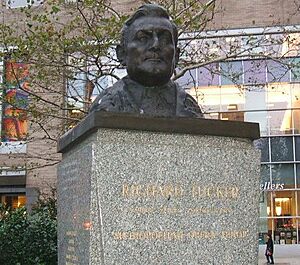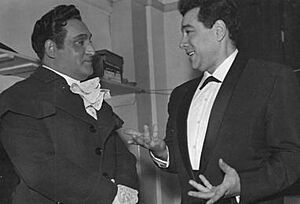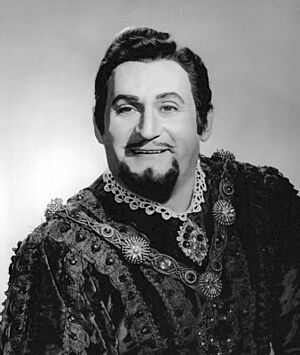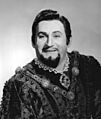Richard Tucker facts for kids
Richard Tucker (born August 28, 1913 – died January 8, 1975) was a famous American opera singer. He was a tenor, which means he sang the highest male voice parts in operas. He was also a cantor, a person who leads prayers and sings in a synagogue. Tucker spent most of his career singing at the Metropolitan Opera in the United States.
Contents
Early Life and Music
Richard Tucker was born Rivn Ticker in Brooklyn, New York. He was the youngest of five children. His parents were Jewish immigrants from a region called Bessarabia. They came to the U.S. in 1911.
Richard's musical talent was noticed when he was young. He learned to sing at a synagogue in Lower Manhattan. As a teenager, he enjoyed both sports and singing. He sang at weddings and bar mitzvahs as a student cantor.
He started as a part-time cantor in New Jersey. Later, he became a full-time cantor in the Bronx. By 1943, he was a cantor at the important Brooklyn Jewish Center. Before becoming a full-time singer, Tucker worked as a salesman.
In 1936, Tucker married Sara Perelmuth. Her older brother, Yakob, was also a talented musician. He became a famous radio star and opera singer named Jan Peerce. Peerce made his debut at the Metropolitan Opera in 1941.
Starting His Opera Career
Jan Peerce did not fully support Tucker's dream of becoming an opera singer. However, he did introduce Tucker to a conductor named Zavel Zilberts. Zilberts helped Tucker with his singing. Later, Tucker was taught by Paul Althouse, a well-known tenor.
In 1943, Tucker tried out for the Metropolitan Opera's "Auditions of the Air" but did not win. However, the Met's general manager, Edward Johnson, heard Tucker sing at the Brooklyn Jewish Center. Johnson offered him another audition and soon gave him a contract.
On January 25, 1945, Richard Tucker made his debut at the Met. He sang the role of Enzo Grimaldo in the opera La Gioconda. This performance was a big success. It marked the start of his 30-year career as a leading American tenor at the Met.
Two years after his Met debut, Tucker sang in La Gioconda again in Verona, Italy. He performed with the young and talented Maria Callas. In 1949, his career grew even more. The famous conductor Arturo Toscanini chose Tucker to sing in a concert performance of Aida. This performance was broadcast on radio and television. It was one of the first complete operas ever shown on national TV.
Tucker's Singing Style
Over the years, Tucker's voice grew stronger and more dramatic. Critics praised his clear voice, strong technique, and perfect pronunciation. Luciano Pavarotti, another famous tenor, once said that Tucker was like an "Italian" tenor. He meant that Tucker sang with the passion and style of Italian singers.
Many great tenors sang at the Metropolitan Opera during Tucker's time. But Tucker remained a top singer and kept taking on new and challenging roles. He was known for his singing, but later in his career, he also became a strong actor. In 1970, when he was almost 60, he gave a powerful performance as Canio in the opera Pagliacci.
Life Outside Opera
Besides his opera performances, Tucker often gave concerts across the U.S. He frequently sang at outdoor concerts in New York City.
Throughout his opera career, Richard Tucker remained true to his Jewish faith. He kept a kosher home, following Jewish dietary laws. He also regularly led services as a cantor for important Jewish holidays. He made sure his three sons, Barry, David, and Henry, learned about their religion. His sons even sang with him on a TV show in 1952.
Tucker recorded many albums with Columbia Records and RCA Victor. His recordings with soprano Leontyne Price were especially well-known. He also recorded Aida with Maria Callas and the Verdi Requiem. Many of his performances were recorded and are still available today. Some of his TV appearances were also saved and can be watched on video.
Richard Tucker was known for being a confident performer on stage. Off stage, he was a private and thoughtful person. He always looked forward and had a youthful view of life.
Death and Legacy

Richard Tucker died suddenly from a heart attack on January 8, 1975. He was in Kalamazoo, Michigan, on tour with singer Robert Merrill. His funeral was held on the stage of the Metropolitan Opera House. He was the only singer ever given this honor.
Soon after his death, the Richard Tucker Music Foundation was created. His family and friends started it to help young, talented singers. The foundation gives out large grants and scholarships. Many famous opera singers have received awards from this foundation.
To honor his memory, New York City named a park next to Lincoln Center "Richard Tucker Square."
Images for kids
See also
 In Spanish: Richard Tucker para niños
In Spanish: Richard Tucker para niños




